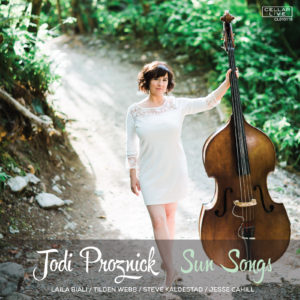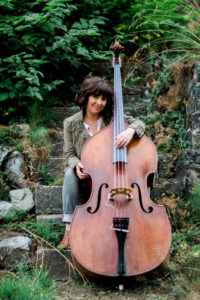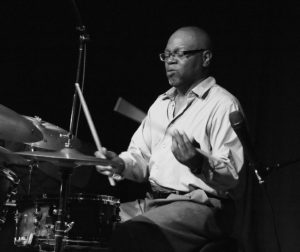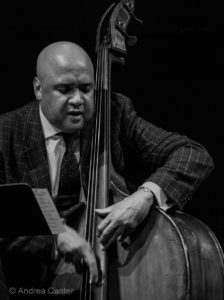Interview with Lorna MacLachlan
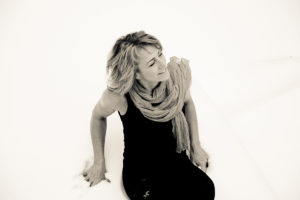
Pianist/vocalist Lorna MacLachlan and her group of local Calgary artists will be performing her original compositions at BuckingJam Palace on Saturday, November 9th 2019 (8pm).
Lorna was nice enough to take some time out of her busy schedule to answer a few questions about her music and art in advance of her November concert.
Tell us about your musical backgroud? How did you learn to play Jazz? What is your education?
I studied piano with, arguably, Calgary’s best piano teachers - Peter Walker, Marilyn Engle, and a few others. I studied classical piano and composition with the intention of doing a double major at the University of Calgary but Composition grabbed me and I spent more time writing than practicing (I actually started writing when I was about 12 years old). I finished a Masters in Music in Theory and Composition and then wrote professionally for everyone and anything. That is not easy in Calgary as there were very few opportunities. I wrote for Theatre Calgary, Decidedly Jazz Danceworks, Lunchbox Theatre, Springboard Dance collectives, Access network television, CBC, etc.
I loved writing but I found it difficult to balance that life with my family (ie. you cannot say NO to contracts or they dry up) so I went back to school after 10 or so years and completed an education degree. I landed an amazing first job at Western Canada High School upon my graduation and taught Choral music and Jazz Band for 15 years. I think we all had an amazing run but then it was time to move on. I went to a small private school for a few years and before returning to the Calgary Public School Board. I loved every experience I had and that is no small feat. Teaching is very challenging and it is not getting easier. It is, however, one of the most purposeful jobs I have ever known. I retired from teaching this year, after 24 years, so that I can pursue writing and playing full time.
As a “classical” musician I was pretty square but I loved Bartok (thank you Marilyn) mostly because of his crazy rhythms. As a writer I emulated his rhythmic ideas in string quartets, solo compositions and choral music. As a player I became more interested in learning about improvisation as I was also quite heavily into electronic music in my last few years at U of C. There was a great electronic music lab at the University - and a Fairlight computer (you may not know what this is but suffice it to say that the pioneers of electronic classical music made it possible for those crazy keyboard racks in the 80s). I found by combining the heavily structured and programmed electronic music with improvisation you could bring life to music that may feel a bit contrived. Keeping in mind that programming these computers was not the same as the super friendly computers of today. I remember programming a piece of music that took about 3 hours and lasted about 10 seconds and sounded like a fridge being plugged in and unplugged and then plugged in… I think you get my drift. Improvisation was so life giving in combination to this.
I wanted to know more. I joined a band and played keyboards. Then I started programming bass lines and playing live with computers and other live musicians. I never wanted to be a Pop/Rock musician, I just wanted to learn more about something I didn't know. I gravitated to a funkier/Jazzier side of things - Prince was inspiring (Sign of the Times), Peter Gabriel (everything), Sting (Dream of the Blue Turtles). I loved their work. The first CD I wrote was called Jigsawand I was given the support of a FACTOR grant (1988). I felt like I was really on the right track!
Worst album I ever recorded.
Biggest budget I ever had.
Greatest learning experience of my life.
Fortunately for everyone it is no longer available.
The second CD was called Two Trees. It was almost 20 years later and since then I have not stopped. I have written and produced 6 full length studio albums and, in my opinion, they get better with each one. (Jigsaw, Two Trees, Telegraphy, Time 4 Change, Feet on Ground, Bicycle Riding in the Dark). That is the point of recording for me: It is a document of where I am and what I have learned and that may or may not be of interest to anyone. As a teacher, artist and as a person, I am most interested in learning. In connecting and discovering what motivates me and how to take that information and make beautiful connections through music, language and relationships.
I have had the honour and privilege of studying with so many amazing teachers. Inspiring teachers. Incredible role models.
I include the inspiring teachers right here in Calgary: David Ferguson, Peter Walker, Greg Levin, Marilyn Engle, Michelle Gregoire and in other cities: David Braid, Kenny Wheeler, Don Thompson, Phil Dwyer, Maria Schneider. I could go on for the numerous opportunities that all the Jazz Educators conferences awarded me in Toronto, New Orleans and New York but I’m sure you are bored with this list already.
I spent several weeks flying to Toronto to study with David Braid. He would set me up in a practice room, give me a month’s worth of work and then meet me the next day to see what I might have accomplished. I sincerely hope to continue my studies in Toronto.
I have also learned a great deal from the musicians I get to play with: Robin Tufts, Richard Harding and Andre Wickenheiser - Very smart and talented players. The learning continues.
Who are your influences?
Bach (J.S.), Mozart (W.A.), Igor Stravinsky, Bela Bartok, Brad Mehldau, Bud Powell, McCoy Tyner, again, David Braid, Dave Holland, Maria Schneider, Amina Figarova, Joni Mitchell, Blossom Dearie to name only a few. All the guys in my band.
How do you approach composing music?
Well, yes, how do I approach composition? When it is my choice -patiently, reluctantly, regularly (there are times when it approaches me but those are not as common as the times I have to approach it).
I think about Kenny wheeler when he was explaining his approach to writing. It is exactly as I dream I would like to write, that is: You wake up at a reasonable hour (say, 6:30 am), you go to the piano with a strong coffee and play for a couple of hours. You then shower, pour another coffee and get to work. If you’re lucky, the work will lead to an amazing inspired thought around 6:30 pm, if you’re not, you probably got a lot of work done on the last inspired thought you had.
I always like to have three (minimum) pieces on the go. This helps keep me motivated.
My life and work has not looked exactly like this. Most of my writing has happened at the end of a very long day or on a weekend. That said, however, I am working toward making it like the above dream.
I do believe being a composer involves the same kind of work as being a great pianist: you need to practice everyday and much of the work is not as inspiring as one would hope. You write all your garbage down (don’t worry, you can throw it out later). There can be great inspiration in the work you think is nothing and, by the same token, the work you think is awesome today may sound like crap tomorrow. Compositions need to breath and editing is key. This is a very important point for me! In the early years, I often believed that my work was a bit of a gift from the heavens: sacred. After years of study with some incredible teachers, I learned that there is much to learn and that your first draft is - exactly that - a draft. A composition is what is created when you take an inspired (hopefully) idea and work it out. This is often, labour intensive and I, like most people, don’t want to work that hard. I have to admit, though, I am pretty disciplined. Sometimes I think that has come about because I have limited talent. That statement right there does not usually help me sell CDs on my website but sometimes it FEELS like it is true. Now, I would not normally disclose this but this is not an original thought. In fact, one of the most talented (or perceived as such) artists I know told me this: “If anyone knew how hard I worked, they might think I have no talent at all”. This is my mantra.
There is also another necessary factor that makes writing important enough in your life to keep you going - for me, it is my voice. For me, I write to know myself better. This does not happen in a year or two. Through composition and improvisation I feel I have a direct line to my subconscious. Most artists I know are more interested in figuring out what motivates, captures, connects people and occasionally what entertains (but generally less of the later). Most artists I get to hang with are the most insightful, aware people I know. This can be challenging in a world that does not recognize awareness as much as money and fame but to the artist, this becomes more valuable.
Teaching is very much like this. Especially when you are inspiring students who may otherwise never have the opportunity to learn the value of great art. Of course I believe that teachers are incredibly underpaid and overworked as they inspire , and often, parent each new generation.
What is your concept for your own group and what repertoire will you be performing?
I’m not sure I have a specific “concept” for my group. I write music that is inspired by life and I arrange it with these players in mind. I love bass lines, in general, so I love working with Jeremy Coates because he is not only incredibly competent but incredibly musical. I love Robin Tuft because he is the most creative drummer I know and I love writing for two horns and I feel so lucky to have these particular two horns. I have a good idea how Richard Harding and Andre Wichenheiser play individually and how they play together. They, along with the rhythm section have a beautiful connection and really bring my ideas to life. There is a great deal of mutual respect in the group.
I am not really interested in virtuosity, however, when players are as competent this, I know it is fun to challenge each other at times. Some of this music is not easy but we work through it and these players make it sound effortless. I feel the freedom to write anything and I know they will be able to not just play it but to interpret it with the meaning I intended.
The core of this group has been together for a long time. I feel we respect each other as players and, more importantly, as people. We have all been through challenging times and we have all been there for each other. This connection is at the core of the music I want to make.
What are your future plans with this project and what other projects are you planning in the future?
I plan to keep writing. My objectives in the next year are to get better as a player (I have a trip to Toronto in the works). As long as I feel I have something to say, musically, I will continue to write. When I have nothing to say, I will stop.
I always think the latest recording will be my last but that what I though 5 or so recording back so I never know. If I write 15 or 20 tunes that I think are stunning and need to be recorded, I guess I will find the money to do another CD.
In my dreams, I would like to do a European tour (without using up all my savings). We’ll see about that.
What advice do you have for students who are interested in pursuing a career as a music educator?
To those students who are thinking of teaching music here is my advice:
1) You better be passionate about your area in music and a few other areas in music as well as in other subject areas. Stay playing and practice. When you get to the place where you can’t play anymore your are not as effective as you think. Take some lessons. I have always been pretty fortunate in that I taught predominantly music for my career - this does not happen as much anymore. You need to KEEP yourself feeling passionate about music and if you stop feeling that way you need to inspire yourself to keep the passion going (i.e. keep playing, take a class, join a performing ensemble, start a band). All the inspiration you create for yourself continues through you to your students. If you are teaching choral music and you don’t feel anything - stop. I know that sounds harsh but if you are not teaching passion and emotion through music, what are you teaching?
2) Don’t teach your students to become entertainers and don’t fall into the habit of entertaining them. - they get enough of that everyday in this society. Teach them something they don’t already know - that’s your job. The beauty of Bach and Mozart. Who?
3) Teaching is challenging but it is one of the most purposeful occupations you will ever know but only if you keep learning.
4) The most important line I was told by an amazing educator - “remember, you will outlive your administration” I don’t even know if that is relevant here and it may sound radical but I never forgot it and it saved me on more than one or two occasions - it is true.
5) Relationships with other teachers are important but the most important relationships you have are the ones you develop with the support staff in your school (your administrative assistant /secretary does more work for you than you will ever know) The care taking staff are people with complex lives. The last caretaker I had was a cardiac surgeon who could not practice in Canada - don’t assume anything.
